spacer
spacer
News
Holy Names History – Christmas Poetry
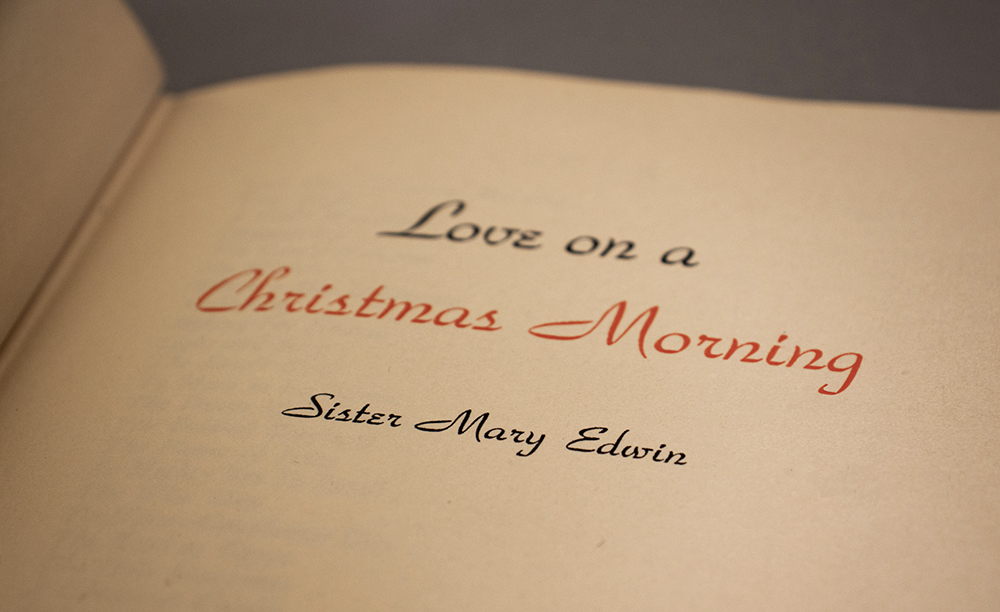
Many Holy Names Sisters composed poetry, including California Sister Mary Edwin O’Neill (1867-1946), who published “Love on a Christmas Morning,” a charming book of poems relating to Christmas, in 1938.
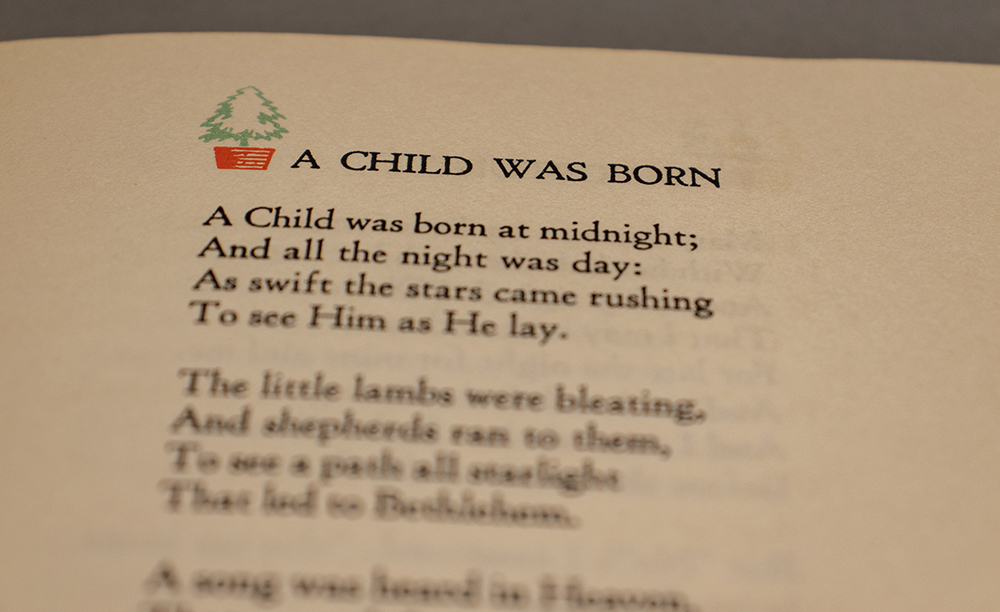
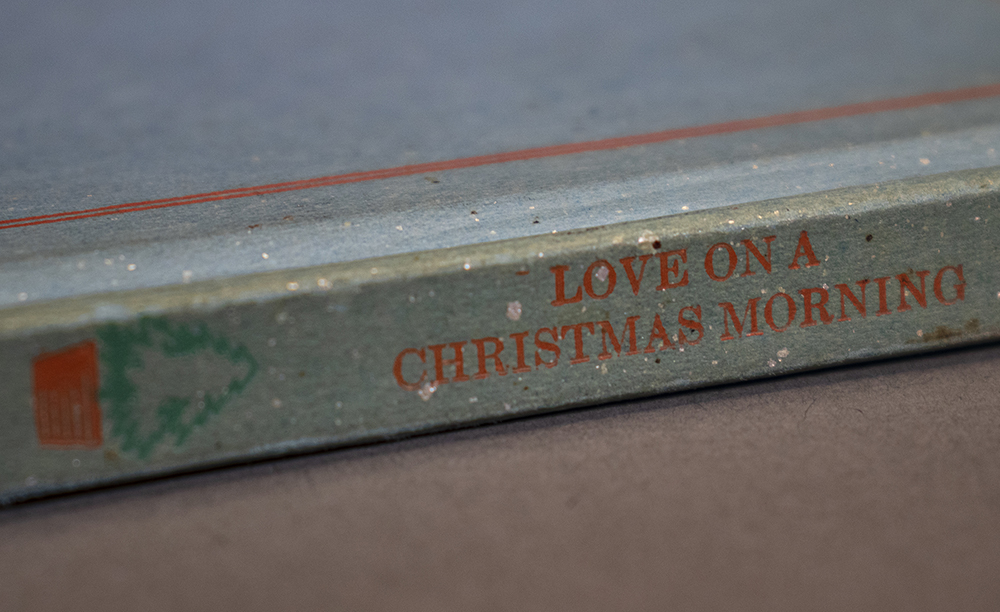
Photos courtesy of SNJM U.S.-Ontario Archives.
We’re sharing objects from the Archives of the Sisters of the Holy Names of Jesus and Mary. The Archives catalogues historical records, objects and publications in order to preserve the history of our institution, schools and ministries.
Holy Names History – A Gift from Bing Crosby
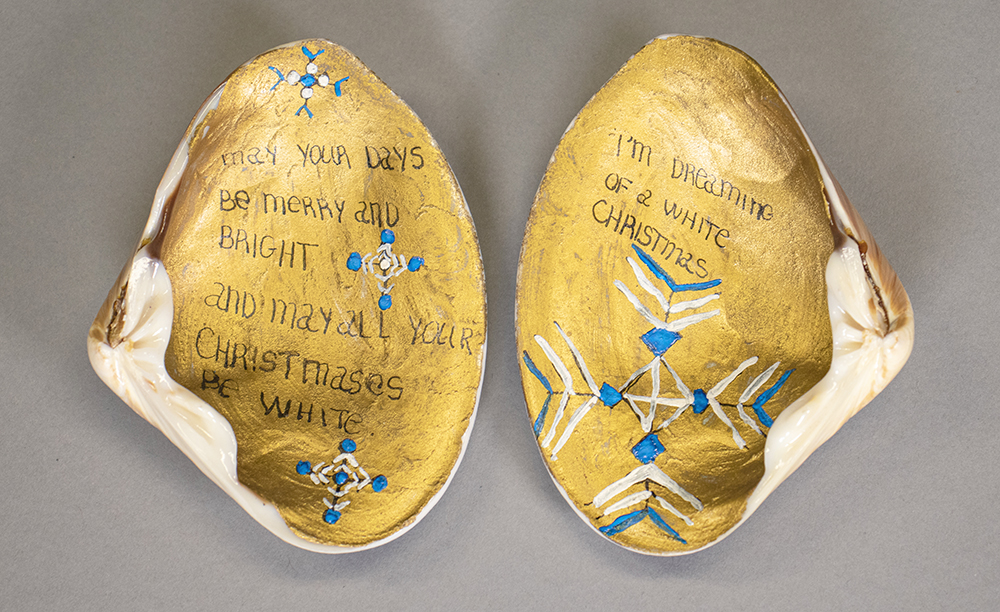
Holy Names Sisters received homemade gifts from Bing Crosby!? Yes, it’s true.
Here is a shell, painted and decorated for Christmas. The accompanying Christmas card reads, “Crafted at Casa Crosby by loving, if reluctant, hands,” signed by singer Bing Crosby and his wife Kathryn. Bing grew up attending St. Aloysius Parish in Spokane, Washington, which was staffed by Holy Names Sisters. Many future Sisters also grew up in that parish and crossed paths with the Crosby family over the years, including Sister Katherine Theresa Fife, to whom this shell was sent in the early 1970s.
Photo courtesy of SNJM U.S.-Ontario Archives.
We’re sharing objects from the Archives of the Sisters of the Holy Names of Jesus and Mary. The Archives catalogues historical records, objects and publications in order to preserve the history of our institution, schools and ministries.
Holy Names History – Nativity Scene
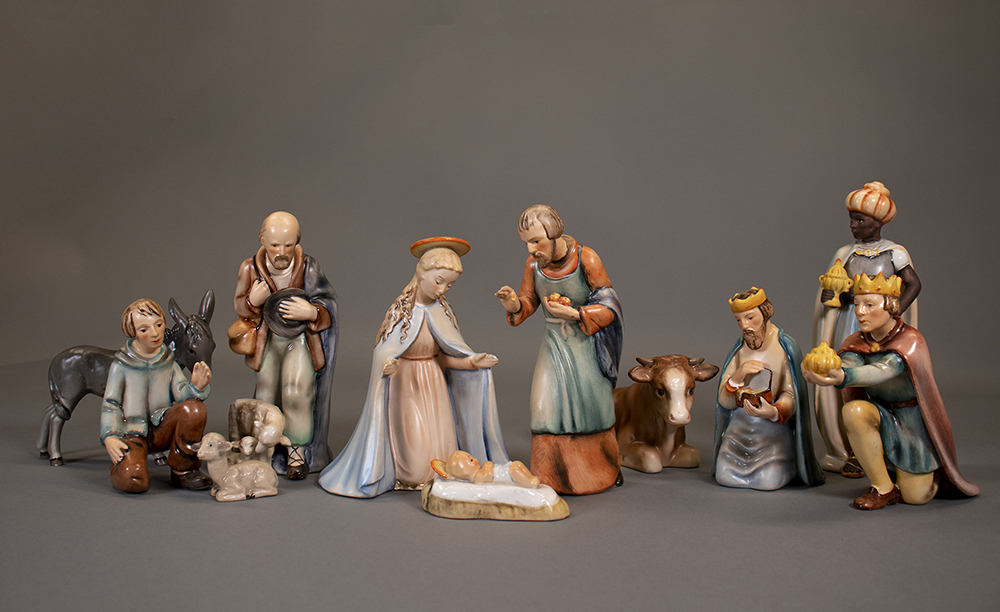
“For to us a child is born, to us a son is given,” (Isaiah 9:6). This creche scene was displayed at Ramona Convent Secondary School in Alhambra, California for many years.
Photos courtesy of SNJM U.S.-Ontario Archives.
We’re sharing objects from the Archives of the Sisters of the Holy Names of Jesus and Mary. The Archives catalogues historical records, objects and publications in order to preserve the history of our institution, schools and ministries.
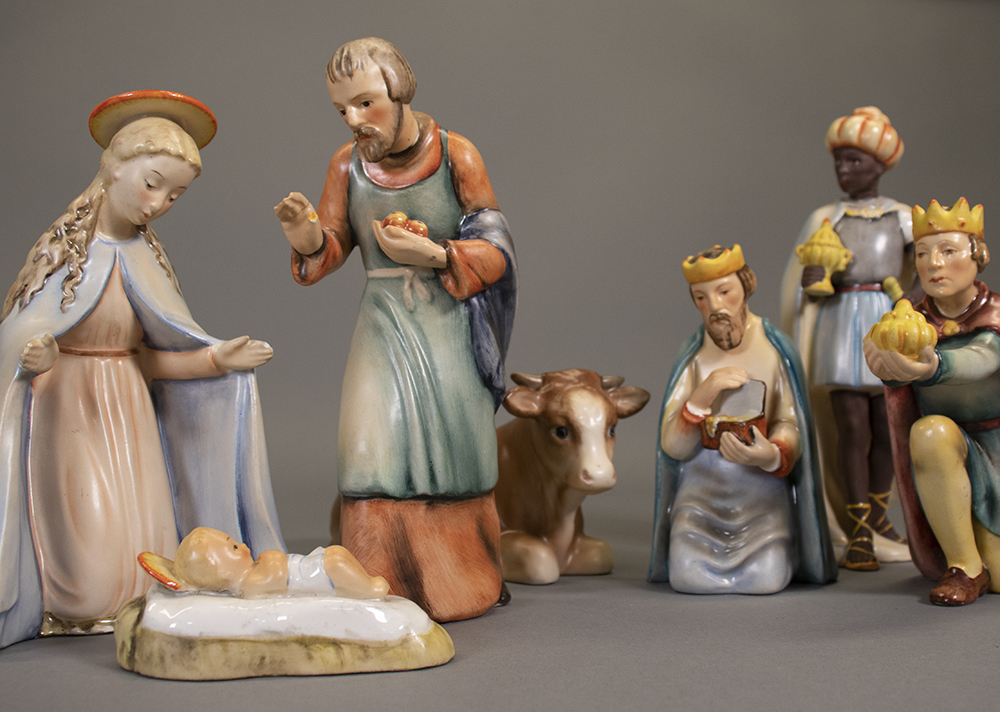
Holy Names History – Journey to Bethlehem
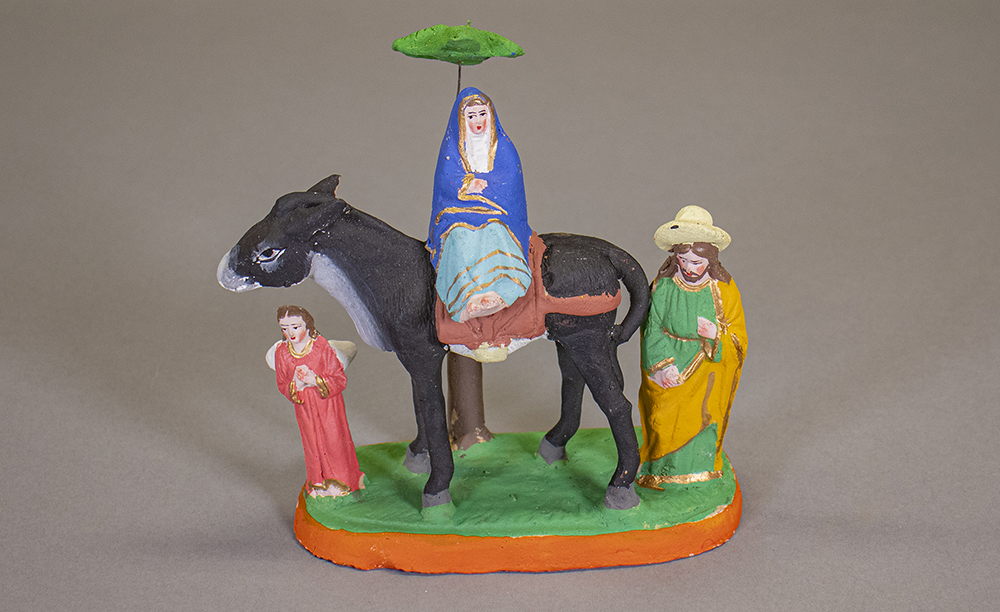
Sisters often bring home souvenirs from their missions around the world. This folk art depiction of Joseph and Mary’s journey to Bethlehem was purchased in Mexico in 1962 and belonged to Oregon Sister Barbara Gfeller.
Photo courtesy of SNJM U.S.-Ontario Archives.
We’re sharing objects from the Archives of the Sisters of the Holy Names of Jesus and Mary. The Archives catalogues historical records, objects and publications in order to preserve the history of our institution, schools and ministries.
Ministering Where There Is a Need: Trinity Catholic School in Spokane, WA
School support for students without stable homes.
Trinity Catholic School in Spokane, WA, is in one of the state’s poorest neighborhoods. Students who live in poverty often experience trauma and emotional distress that disrupts their education. “Many of these students do not have a stable home life at all,” says Sister Irene Knopes, who secured a grant for Trinity to hire a part-time school counselor.
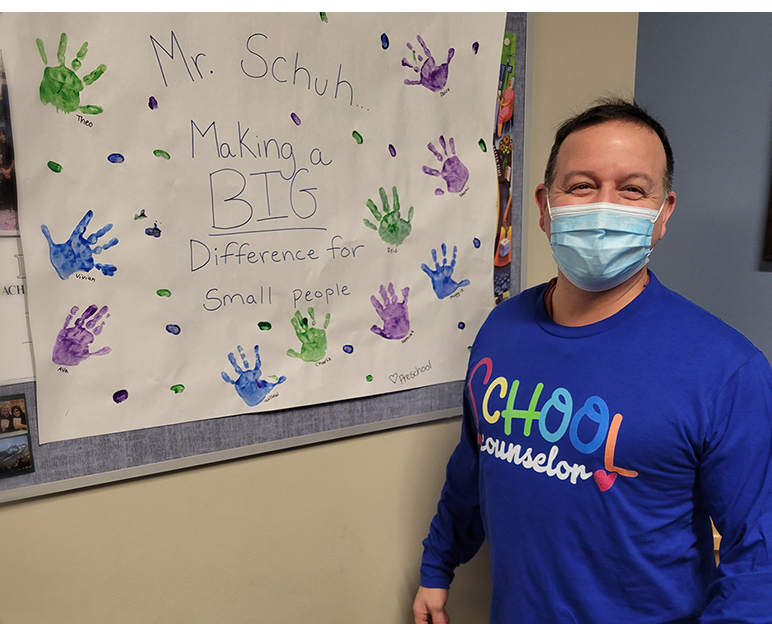
Trinity Catholic School Counselor Tony Schuh.
As the new counselor began supporting students and their families, the impact was profound. “Having a counselor has made an astronomical difference in the social-emotional learning that we’re able to provide to the students,” said Principal Stacie Holcomb. This much-needed service is improving the educational experience for young people in Spokane.
Listen to an interview with Sister Irene Knopes and Trinity Principal Stacie Holcomb:
Ministering Where There Is a Need: Friendship Office of the Americas
Empowering women seeking human rights.
In 2014, Pope Francis wrote that migrants provide “an occasion that Providence gives us to help build a more just society.” That message reverberates at a ministry supported by Sister Carol Ries seeking to counteract forces that lead desperate people to flee Central America. The Friendship Office of the Americas has worked for years in Nicaragua and Honduras to document rights abuses where women have faced danger when they seek restoration of lost land or information about loved ones who have disappeared. “The quest for human rights is probably what is most visible and accompanying that is the leadership of women that is empowered by this project,” says Sister Carol.
Listen to an interview with Sister Carol Ries and Jennifer Atlee from Friendship Office of the Americas:
Ministering Where There Is a Need: St. Andre Bessette Church in Portland, OR
The joy of this places shines like a light.
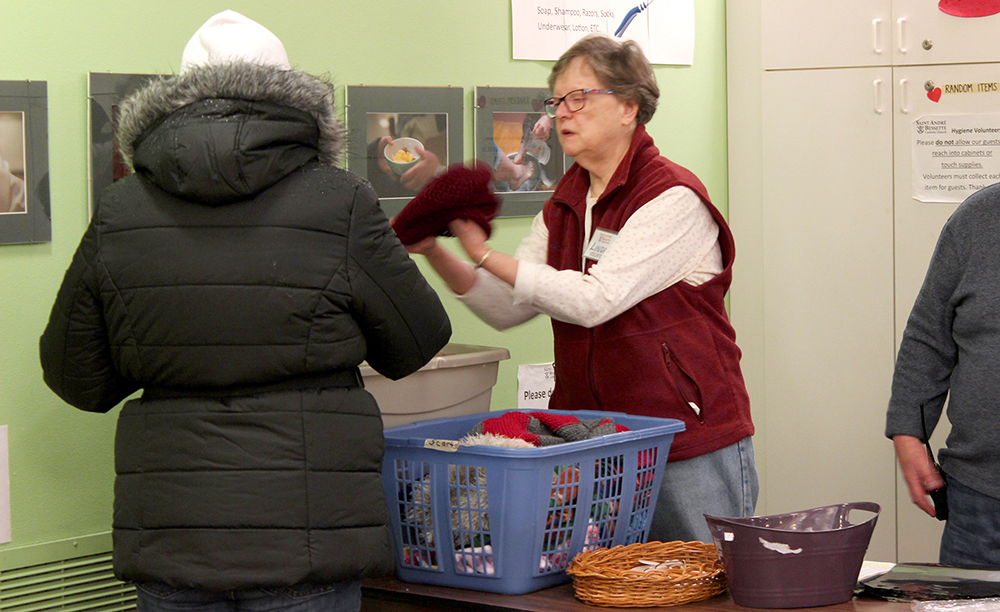
Sister Linda Patrick assisting a guest of St. Andre Bessette’s community hospitality program in Portland, OR.
This past spring, Father Tom Gaughan, CSC related how six homicides occurred within walking distance of St. Andre Bessette Church in Portland, OR, just since Christmas Eve. “It’s saddening. In the midst of all that, the joy of this place shines like a light.”
Sister Linda Patrick is a long-time volunteer at the parish, helping to serve visitors who come seeking coffee, a meal, clothing and – most importantly – a welcome respite from the harsh streets. Father Tom shared that the SNJM Ministry Grant and the dedication of Sister Linda has helped the church “nurture community, restore hope and share God’s persistent love.”
Listen to an interview with Sister Linda Patrick and Father Tom Gaughan:
Ministering Where There Is a Need: Santa Chiara Children’s Center in Port-au-Prince, Haiti

Sister Vera Ruotolo’s voice strains with emotion as she reads aloud a mission description of Santa Chiara Children’s Center in Haiti: “In our humble, very limited way, Santa Chiara is a kind of field hospital for kids, who come to us weary from their battle with extreme poverty, hunger and emotional neglect.”
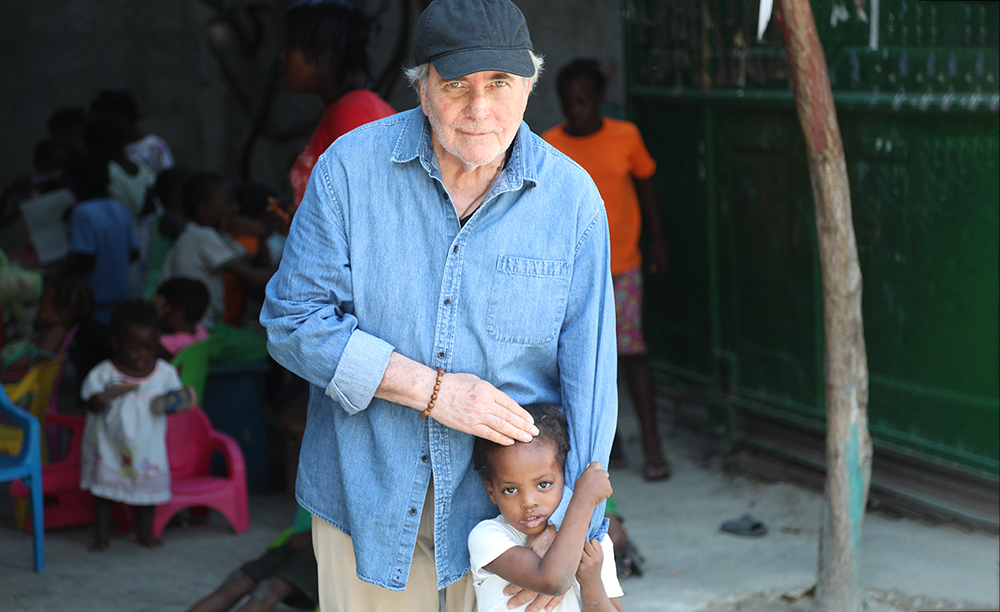
Santa Chiara founder Fr. Gerry Straub.
The center’s mission aligns with the life work of Blessed Marie Rose Durocher – a pioneer in education for the poor and neglected – by providing a safe place of hope for at-risk Haitian children. Sister Vera has become a stalwart supporter and friend of founder Gerry Straub, OSF. Gerry has been able to use SNJM Ministry Grant funds to care for children at the clinic.
Listen to an interview with ministry partner Sister Vera Ruotolo:
Beauty in Our World: Sister Mary Noreen O’Leary

Sister Mary Noreen O’Leary in the studio.
As we celebrate Sister Mary Noreen O’Leary after 100 years of life and 73 years of religious profession, her legacy of using art as “a source of new vision” for creation and education lives on through her work and her countless students.
For over 30 years, Sister Mary Noreen was a beloved instructor in the Marylhurst College Art Department. She had the challenge and the joy of convincing young people preparing to become teachers that they were equal to the challenge, including teaching art.
After leaving the college, Sister Mary Noreen spent many years teaching private art classes to children and adults in her Marylhurst studio. Throughout her life, she remained a practicing artist whose extensive body of work includes serigraph, mosaic, block print, oil and acrylic works.
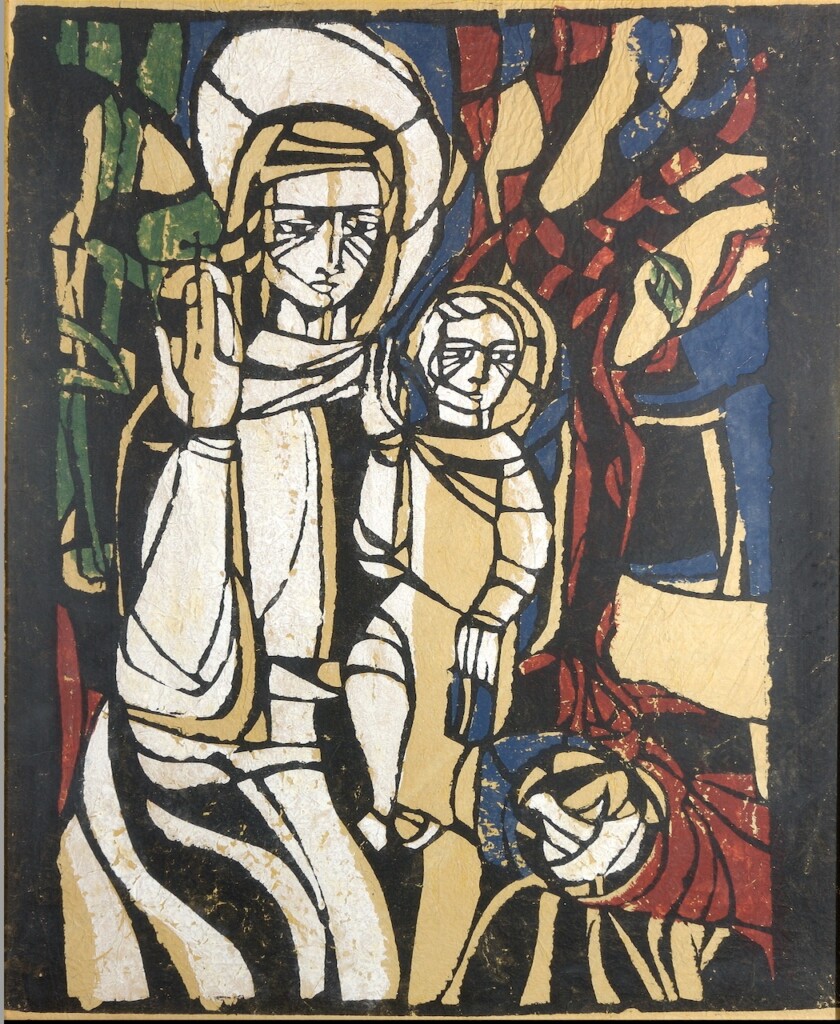
“Madonna and Child”
A primary tenet of her philosophy of art was “The Adventure of Seeing!” The creative environment and diverse collections of her studio enhanced her students’ power to see beyond the external and to venture into “the within” in their exploration and experimentation with various media.
Sister Mary Noreen perceived art as a positive challenge. “It is a means by which we can explore and enjoy our world — both the inner world and the outer one,” she said. “Like life, art is a constantly growing experience. It does not disregard suffering. Rather, it is a tool for thinking and a source of new vision.”
Sister Mary Noreen recognized the value of art to human life and spirit. Whether participating in the richness and appreciation of the work of others, or imparting the values and principles of art to learners, she understood that art making and art immersion are important to the full development of the human person.
Holy Names History – Memorial Art
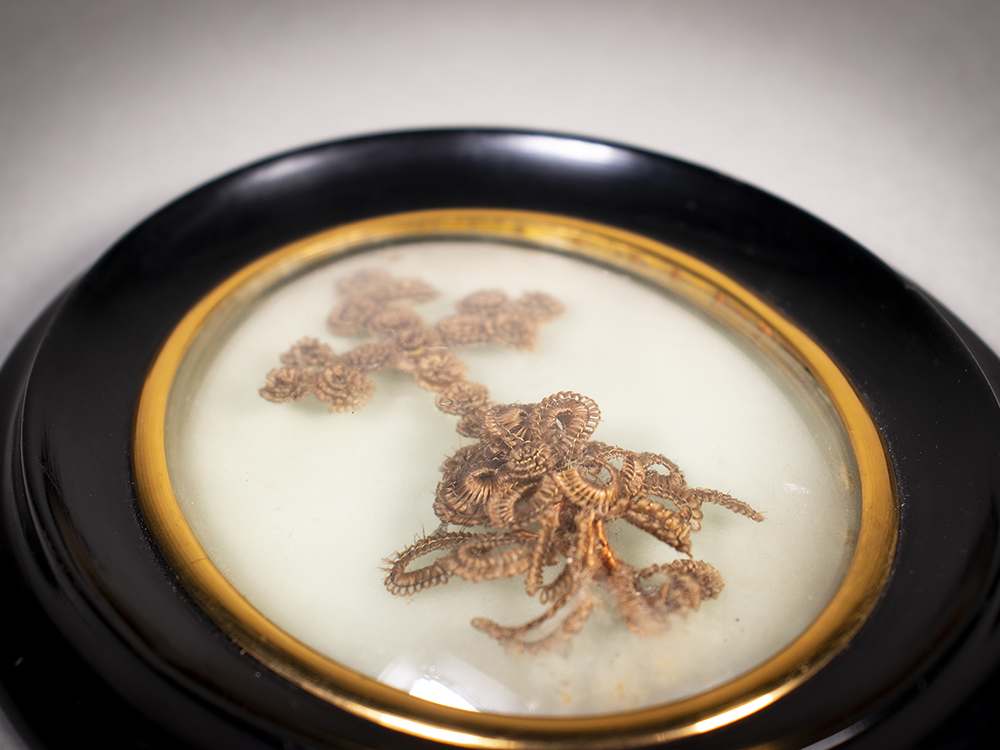
Victorians used hair art, worn as jewelry or crafted into elaborate display pieces, to mourn the loss of loved ones. This piece contains the hair of our foundress, Blessed Mother Marie Rose Durocher.
Photo courtesy of SNJM U.S.-Ontario Archives.
We’re sharing objects from the Archives of the Sisters of the Holy Names of Jesus and Mary. The Archives catalogues historical records, objects and publications in order to preserve the history of our institution, schools and ministries.
